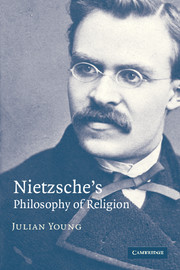Book contents
- Frontmatter
- Contents
- Acknowledgements
- List of abbreviations
- Introduction
- 1 Schopenhauer and ‘Man's Need for Metaphysics’
- 2 The Birth of Tragedy
- 3 Untimely Meditations
- 4 Human, All-too-Human
- 5 The Gay Science
- 6 Thus Spoke Zarathustra
- 7 Beyond Good and Evil
- 8 On the Genealogy of Morals
- 9 The Wagner Case
- 10 Twilight of the Idols
- 11 The Antichrist
- 12 Ecce Homo
- 13 Epilogue: Nietzsche in history
- Bibliography
- Index
3 - Untimely Meditations
Published online by Cambridge University Press: 27 October 2009
- Frontmatter
- Contents
- Acknowledgements
- List of abbreviations
- Introduction
- 1 Schopenhauer and ‘Man's Need for Metaphysics’
- 2 The Birth of Tragedy
- 3 Untimely Meditations
- 4 Human, All-too-Human
- 5 The Gay Science
- 6 Thus Spoke Zarathustra
- 7 Beyond Good and Evil
- 8 On the Genealogy of Morals
- 9 The Wagner Case
- 10 Twilight of the Idols
- 11 The Antichrist
- 12 Ecce Homo
- 13 Epilogue: Nietzsche in history
- Bibliography
- Index
Summary
Discussions of Nietzsche typically move directly from the ‘romanticism’ of The Birth to the ‘positivism’ of Human, All-too-Human. The Untimely Meditations, poised, it is felt, in an uncomfortable no man's land, generally get short shrift. For two reasons, however, this is unfortunate. First, because they contain a great deal of very good philosophy. And second, because many later ideas have their origins in the Meditations and become much more intelligible when read in the light of those origins. I shall discuss the four Meditations in the obvious order. The question that guides each discussion is that of whether the conclusion of The Birth, that religion is essential to life, is preserved in the Meditations.
FIRST MEDITATION: ‘DAVID STRAUSS: THE CONFESSOR AND THE WRITER’
David Strauss was a Hegelian who wrote a ‘deconstructive’ Life of Jesus in 1835–6. By discovering inconsistencies between the gospels and establishing that a recognisably Christian faith only came into being after Jesus' death, this book probably made a significant contribution to Nietzsche's own abandonment of Christianity in 1865. Though generally extremely rude about him, Nietzsche admits that Strauss had once been a fine scholar. In this, the first of the Untimely Meditations (1873), Nietzsche attacks the aged Strauss who offers Hegelian optimism – a kind of evolutionary pantheism – as an alternative religion. It affirms the ‘rationality of the real’ (UM i 2) as leading to a ‘heaven on earth’ (UM i 4).
- Type
- Chapter
- Information
- Nietzsche's Philosophy of Religion , pp. 34 - 57Publisher: Cambridge University PressPrint publication year: 2006



